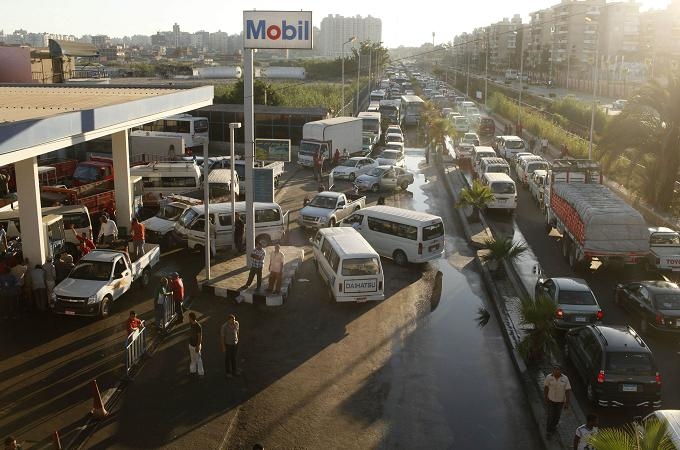Latest NEWS
- Aswat Masriya, the last word
- Roundup of Egypt's press headlines on March 15, 2017
- Roundup of Egypt's press headlines on March 14, 2017
- Former Egyptian President Hosni Mubarak to be released: lawyer
- Roundup of Egypt's press headlines on March 13, 2017
- Egypt's capital set to grow by half a million in 2017
- Egypt's wheat reserves to double with start of harvest -supply min
- Roundup of Egypt's press headlines on March 12, 2017
Egypt's EGAS expects delay in gas import terminal - source

Drivers wait alongside their vehicles in long queues at a gas station during a fuel shortage in the country, in Alexandria June 24, 2013. REUTERS/Asmaa Waguih
CAIRO, June 29 (Reuters) - Egypt expects a delay in the delivery of an import terminal for liquefied natural gas (LNG), a plant that is expected to help it combat the worst energy crisis in years, a source at Egyptian Natural Gas Holding Company (EGAS) said on Sunday.
Egypt can export LNG but cannot import it without installing the terminal. Meanwhile, its worsening gas shortage has caused power cuts that are becoming more acute as people switch on air conditioning units against the sweltering summer heat.
Egypt's oil ministry and Norway's Hoegh LNG said in May they had agreed for Egypt to use one of Hoegh's Floating Storage and Regasification Units (FSRU) for five years and that the terminal would be in place by September.
"We haven't yet reached a final agreement with Hoegh. The terminal will not arrive in September as had been announced before. It will arrive in October or November," the source, who has direct knowledge of the matter, told Reuters by telephone.
"It is expected that we will overcome the obstacles during a visit from a delegation of the Norwegian company next week and that we reach a final agreement," said the source, who asked to remain anonymous. He declined to explain what obstacles remained to the final agreement.
Hoegh was not immediately available for comment on Sunday.
Oil Minister Sherif Ismail has hinted in the past that more work needed to be done before the terminal could start operating.
"The contract is not finished with the Norwegian company for the tenting of the FSRU... what happened (in May) was a preliminary agreement," Ismail told Reuters this month.
Gas is in short supply due to declining domestic production, forcing the government to divert gas earmarked for export to the domestic market. Egypt relies heavily on gas to generate power.
Algeria will deliver to Egypt five liquefied natural gas cargoes of 145,000 cubic metres each this year, which should go some way to alleviating the shortages.
Egypt has also said in the past that it was considering gas imports from Russia's Gazprom and Gaz de France.
Though paying for imported natural gas is less desirable for Egypt than contracting with foreign firms to exploit domestic reserves, violent unrest since the 2011 uprising that ousted autocratic President Hosni Mubarak has hurt investor confidence.
Companies have been wary of developing reserves, and the government's promises to offer more appealing terms to reassure them have not yet resulted in new contracts. (Reporting By Abdel Rahman Adel; Writing by Shadia Nasralla; Editing by Keiron Henderson)










